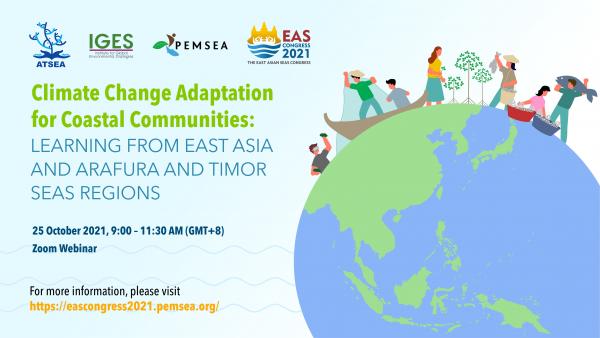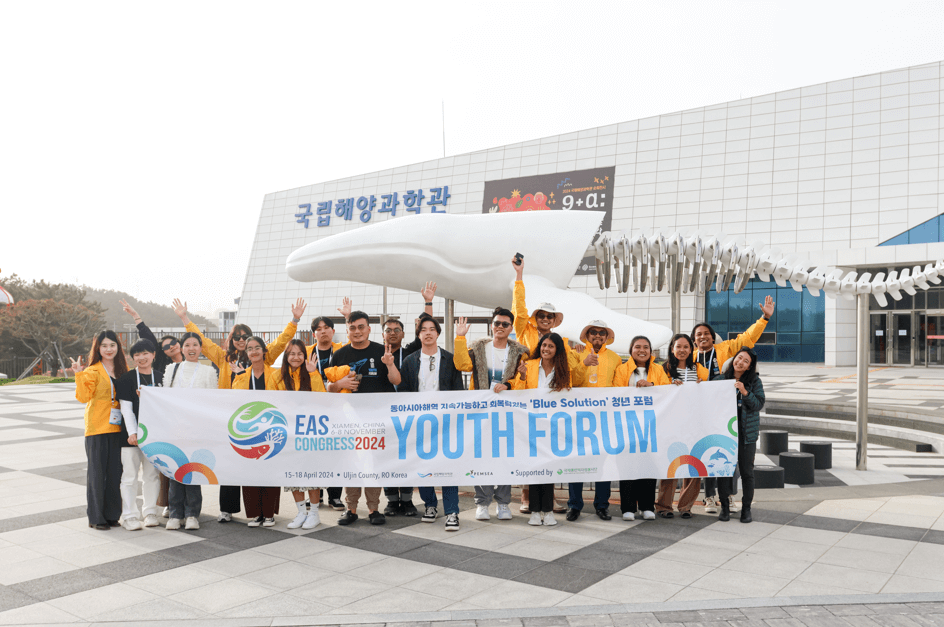Climate Change Adaptation Measures to Benefit Coastal Communities in East Asia, Arafura and Timor Seas
Wednesday, 6 October 2021

Countries in the East Asian Seas (EAS) region and its neighboring Pacific countries are highly vulnerable to rising sea levels due to its low-lying communities and densely populated coastal cities. Additionally, the region also has the highest proportion of weather-related disaster displacement in the world. A recent climate change vulnerability assessment for the Arafura and Timor Seas (ATS) region has also identified hotspots (or highly vulnerable marine habitats) and species in the region.
In response, several climate change adaptation (CCA) initiatives have emerged in the EAS and ATS regions. These include the implementation of climate-responsive integrated coastal management (ICM) and the application of a practical CCA decision-making guidance document for policy-makers and other stakeholders. Lessons learned and good practices generated from these efforts will be shared amongst the EAS and ATS network through a virtual pre-2021 EAS Congress collab that will discuss best practices and enable their replication across other sites.
Titled “Climate Change Adaptation for Coastal Communities: Learning from East Asia and Arafura and Timor Seas Regions,” the webinar will be held on October 25, 2021 from 9:00 am to 11:30 am (GMT+8) and is organized by the GEF/UNDP/PEMSEA Arafura and Timor Seas Ecosystem Action Phase II (ATSEA-2) Project. Co-organizers are the Partnerships in Environmental Management for the Seas of East Asia Resource Facility (PRF) and the Institute for Global Environmental Strategies (IGES) of Japan.
The event aims to: (1) raise awareness and have better understanding of climate change impacts on coastal communities in the EAS and ATS regions; (2) share climate change vulnerability assessment results and introduce a decision-making guide developed for the ATS region; (3) showcase best practices and share lessons learned from the EAS and ATS regions in developing and/or implementing local climate change adaptation strategies; and (4) contribute to enriching discussions and synergies toward CCA efforts in support of the EAS region’s Sustainable Development Strategy for the Seas of East Asia (SDS-SEA), the ATS region’s Strategic Action Programme (SAP), as well as the bigger objectives of the United Nations Framework Convention on Climate Change (UNFCCC).
Featured key speakers include:
- Dr. Brian Johnson, Deputy Director, IGES
- Dr. Johanna Johnson, Director, C20 Consulting
- Ms. Cristine Ingrid Narcise, Policy and Result-Based Management Specialist, ATSEA-2
- Ms. Nisakorn Wiwekwin, ICM Program Coordinator, Saensuk Municipal Office, Chonburi, Thailand
Mr. Ikbal Alexander, Director, Kertabumi Recycling Center

Participants will include climate change scientists and practitioners, local decision-makers, and coastal community members from the EAS and ATS regions. The event is also open to the general public and comes at no cost.
Interested individuals are advised to register for the event through this link by 21 October 2021 (11:59 PM, GMT+8) to receive the Zoom details. For regular updates about other EAS Congress events, kindly visit https://eascongress2021.pemsea.org.
ABOUT ATSEA-2
Started in 2019, ATSEA-2 is the second phase of the Arafura and Timor Seas Ecosystem Action (ATSEA) Programme, a regional partnership involving the Governments of Indonesia, Timor-Leste, and Papua New Guinea, with the support of the Australian Government. The group works to devise and implement solutions to the most important transboundary marine issues facing the ATS region.
ABOUT IGES
The Institute for Global Environmental Strategies (IGES) was established in March 1998 under the initiative of the Japanese government and with the support of Kanagawa Prefecture (Japan) based on the “Charter for the Establishment of the Institute for Global Environmental Strategies.” The aim of the Institute is to achieve a new paradigm for civilization and conduct innovative policy development and strategic research for environmental measures and sustainable development at large in the Asia-Pacific region and global levels by reflecting the results of research into political decisions.
MEDIA CONTACT:
(Ms) Reggie U. Olalia
PEMSEA Communications Specialist
Email: rolalia@pemsea.org
(63-2) 0917-9028121



